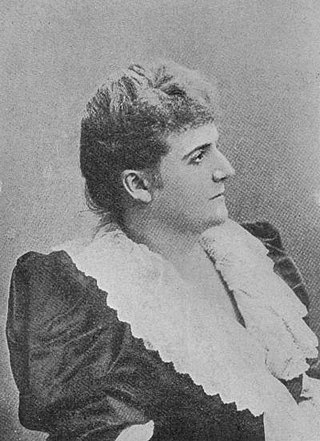Loading AI tools
French composer (1847–1903) From Wikipedia, the free encyclopedia
Augusta Mary Anne Holmès (16 December 1847 – 28 January 1903) was a French composer of Irish descent. In 1871, Holmès became a French national and added the accent to her last name.[1] She wrote the texts to almost all of her vocal music herself, including songs, oratorios, the libretto of her opera La Montagne noire and the programmatic poems for her symphonic poems including Irlande and Andromède.

Holmès was born in Paris, the only child of Charles William Scott Dalkeith Holmes (17 July 1797 - 19 December 1869), originally from Youghal, Ireland, and Tryphina Anna Constance Augusta Shearer (1811–1858).[2][3] The poet Alfred de Vigny, who was her godfather, was rumored to be her natural father.[4]
Despite showing talent at the piano, she was not allowed to study at the Paris Conservatoire, but took lessons privately. She developed her piano playing under the tutelage of local pianist Mademoiselle Peyronnet, the organist of Versailles Cathedral Henri Lambert, and Hyacinthe Klosé. Also, she showed some of her earlier compositions to Franz Liszt. Around 1876, she became a pupil of César Franck, whom she considered her real master.[3] She led the group of Franck's students who in 1891 commissioned for Franck's tomb a bronze medallion from Auguste Rodin.[5]
Camille Saint-Saëns wrote of Holmès in the journal Harmonie et Mélodie: "Like children, women have no idea of obstacles, and their willpower breaks all barriers. Mademoiselle Holmès is a woman, an extremist." Like other female composers from the nineteenth century including Fanny Mendelssohn and Clara Schumann, Holmès published some of her earlier works under a male pseudonym ("Hermann Zenta") because women in European society at that time were not taken seriously as artists and were discouraged from publishing.
For the 1889 celebration of the centennial of the French Revolution, Holmès was commissioned to write the Ode triomphale for the Exposition Universelle, a work requiring about 1,200 musicians. She gained a reputation of being a composer of programme music with political meaning, such as her symphonic poems Irlande and Pologne.
Holmès' oeuvre is made up of cantatas, symphonic poems, operas, a few works for solo piano and over 100 songs.
First hearing Wagner's work at the age of 13, Holmès was influenced by Wagner all her life and advocated to have his works performed in the Concerts Populaires, a formidable concert series in Paris.[6] Many parallels can be found in the music of Holmès and Wagner. One of the most direct examples of stylistic likeness can be heard in Wagner's Ride of the Valkyries from Die Walküre (1856) and Holmès' Roland furieux (1876). Both works make use of chromaticism and use similar orchestral colour, with dominant brass sections, announcing strong, rhythmically catching, melodic motives, while the strings drive the music forward with rapid, galloping patterns underneath the melody.[7]
Holmès wrote four operas, largely inspired by Wagner, however, La Montagne Noire, staged in 1895, was the only one to be performed. It was one of the few operas written by a woman to be produced at the Paris Opéra in the nineteenth century, but it was poorly received, possibly due to its outdated Wagnerian influences.[6]
The gender rhetoric of the nineteenth century, which prescribed that female composers should limit themselves to smaller, feminine genres, had an impact on the reception towards the music of Holmès. Although praised for her creative gifts, she, like many other female composers of her time, was criticised for crossing the boundary into styles which were thought of as masculine territory.[8] Saint-Saëns, in a review of Holmès' symphonic poem, Les Argonautes, remarked on her "excessive virility – a frequent fault with women composers – and flamboyant orchestration in which the brass explodes like fireworks..."[1]

Holmès never married, but she cohabited with the poet Catulle Mendès; the couple had five children, including:[9]
Holmès bequeathed most of her musical manuscripts to the Paris Conservatoire.

(selective list)
Seamless Wikipedia browsing. On steroids.
Every time you click a link to Wikipedia, Wiktionary or Wikiquote in your browser's search results, it will show the modern Wikiwand interface.
Wikiwand extension is a five stars, simple, with minimum permission required to keep your browsing private, safe and transparent.